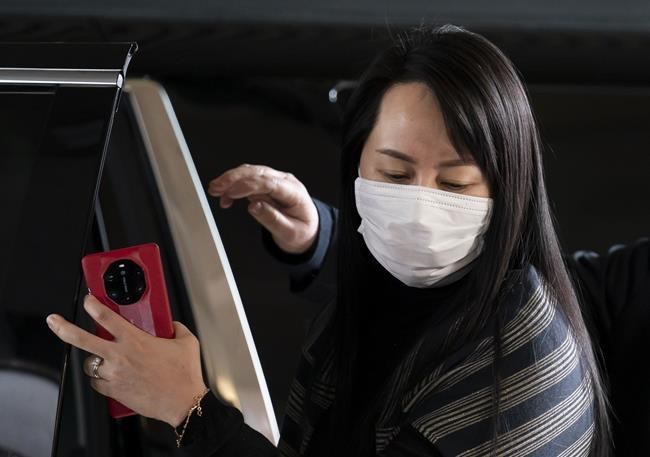VANCOUVER — Staff at international bank HSBC were well aware of telecom giant Huawei's control of another company whose business in Iran lies at the heart of fraud allegations against Huawei executive Meng Wanzhou, the British Columbia Supreme Court heard Monday.
Frank Addario, one of Meng's defence lawyers, told the court that the United States has provided the court with a "manifestly unreliable" description of the case against her and said he has evidence to prove it.
Addario is asking the judge to admit affidavits including emails and bank account information into evidence to support the defence team's case at Meng's committal hearing, scheduled for May.
"We have evidence showing the picture painted for you about (HSBC's) global risk committee's state of knowledge is unreliable and misleading," Addario said.
Meng is accused of misrepresenting Huawei's relationship with Skycom during a 2013 meeting with HSBC, putting the bank at risk of violating U.S. sanctions in Iran.
The U.S. alleges Meng called the meeting to reassure the bank and distance Huawei from Skycom after Reuters published articles suggesting HSBC could be at risk.
Meng was arrested at Vancouver's airport in 2018 at the request of the United States and remains in Canada on bail while the extradition process is underway.
Huawei and Meng, who is the company's chief financial officer and daughter of its founder, deny the allegations.
A lawyer for Canada's attorney general, who represents the United States in the case, accused Meng's team Monday of confusing the limits of an extradition case.
It is inappropriate to ask the judge to weigh things like witness credibility at this stage, Robert Frater said.
"An extradition hearing is not a trial," he said, adding that Addario's language asking for evidence to "balance" the picture betrayed him.
"The very suggestion is one that leads you to consider competing inferences, which the case law says you cannot do," Frater said. "That is not your role."
One of the principles of extradition law is that there is a strong presumption of good faith with respect to the case put forward by the requesting state, he said.
Another is that a person charged with a crime will answer to those charges.
He accused the defence of "cherry-picking" evidence and making an argument of "he must have known" that isn't necessarily supported.
"All of what my friend put to you today, in my respectful submission, is in pursuit of an invitation to you to go beyond the limited function of an extradition judge."
Addario acknowledged that extradition hearings are not the place for "credibility contests," nor do extradition judges typically weigh competing accounts of what happened.
However, he said it's important that the Canadian court not make any decisions based on misleading information from the requesting state.
"Although your powers are limited, there are cases where the inference is so dubious or the evidence is so unreliable that you must admit contrary evidence," he said.
Addario told the court at least a dozen emails prove HSBC staff "fully knew" that Skycom was sold to Canicula Holdings in 2007, that Canicula was Skycom's parent company and that Huawei controlled the Canicula accounts.
A senior banker overseeing HSBC's relationship with Huawei was also included on several emails describing Canicula "in terms that can only be understood as Huawei controlling the account," he said.
Meng's team also wants admitted to evidence a listing of 188 Huawei bank accounts at HSBC from 2011 showing that two were named "Skycom" and "Canicula."
"The relationship between these three entities was open knowledge," Addario said.
This week marks the beginning of about seven weeks of argument between March and May in Meng's case.
Ahead of the actual extradition or committal hearing, Meng's team will argue proceedings should be stayed because she was subjected to an abuse of process.
The team alleges the abuses occurred in four different ways and if any is proven, then Meng should be released.
The first branch of the abuse of process arguments begins Wednesday and hinges on public comments made by former U.S. president Donald Trump during his time in office.
Meng's team alleges Trump used her as a bargaining chip in trade negotiations with China, but Canada's attorney general has countered that the argument is irrelevant now that Trump is out of office.
The court will also consider arguments that Meng's arrest at Vancouver's airport on Dec. 1, 2018, was unlawful, that the United States misled Canadian officials in its summary of the allegations against her and that the case doesn't qualify under international law because Meng had no meaningful connection to the United States.
This report by The Canadian Press was first published March 1, 2021.
Amy Smart, The Canadian Press



